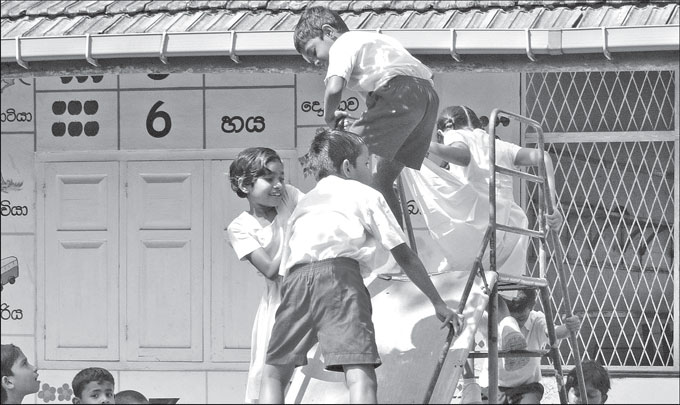|
Children play pivotal role in SL's socio-cultural
life – Part II:
SL has passed LEGISLATION PROTECTING children’s rights
Statement by Plantation Industries Minister
and Special Envoy of the President on Human Rights Mahinda Samarasinghe
at the Third Committee 67th Session of the United Nations General
Assembly on promotion and protection of the rights of children on
October 18, 2012
Legislation was also passed on a number of areas to strengthen
children’s rights and enhance their protection. New laws include the
Prevention of Domestic Violence Act No. 34 of 2005 which provides for
protection orders to be urgently obtained to safeguard those suffering
and at risk of domestic violence, including both women and children and
the Employment of Women, Young Persons and Children (Amendment) Act No.
8 of 2003.

This Act strengthened child labour laws by increasing the minimum age
of employment from 12 to 14 years, and prohibiting the employment of
children under 14 while enhancing the sentence for violation of this
provision. This is in conformity with the compulsory age of education
for children which is 14.
Several other measures have been taken with regard to the prevention
and punishment of trafficking in persons and their exploitation. A
special focus of these initiatives has been the protection of children.
These measures have involved a number of stakeholders including the
Ministry of Justice, Human Rights Commission of Sri Lanka, the NCPA, the
Police and other agencies and offices of government. The Attorney
General has also initiated a process of providing legal advice to the
Police in the conduct of investigation into alleged violations. The
Attorney General’s Department maintains a separate unit called the
Prosecution of Child Abuse Offenders Unit to expedite the institution of
criminal proceedings against persons accused of having committed all
forms of abuse of children.
Children's welfare
A new National Project has been launched by the Ministry of Justice
and the Attorney General’s Department in partnership with the Police
Department to enhance the efficacy of the criminal justice response to
child abuse to better protect the rights of children in the country.
The resources for the project are provided by the GoSL and UNICEF.
The primary objectives of this project are to expedite the processing
and the passage of cases of child abuse through the several phases of
the criminal justice system and to prevent secondary victimization of
child victims of abuse in consequence of their involvement in the
criminal justice system.
|

Minister Mahinda Samarasinghe |
A secondary objective of the project is to enhance the
professionalism in the conduct of criminal and forensic investigations,
and the conduct of prosecutions. The project is presently being
implemented as a pilot activity in 4 Provinces in the island including
the Eastern Province and the Northern Province, the former theatre of
conflict.
The implementation of the project is monitored by a National Steering
Committee headed by the Secretary to the Ministry of Justice and
involves the participation of representatives of the Attorney-General,
Inspector General of Police, Chairman of the NCPA, Secretary to the
Ministry of Health and a UNICEF representative.
We have, on previous occasions, placed before this Committee and
other international forums the sterling record of our achievements in
welfare for children: free education, nutrition, preventive health care
and child protection. Nevertheless, the government is determined to
improve on its record. We have emplaced a national framework for the
achievement of these goals. The overarching National Action Plan for the
Promotion and Protection of Human Rights (NHRAP) has a specific thematic
section on children. This is a plan devised as a result of our
engagement with the Universal Periodic Review Process, our engagement
with treaty bodies and special procedure mechanisms of the UN system.
National policy priorities
Most importantly this plan is a consolidation of government responses
and initiatives to implement national policy priorities. Our plan ranges
from focusing on health and nutrition, protection of vulnerable
children, juvenile justice, children affected by armed conflict,
adolescent health and well being, early childhood care and development,
education, child labour and alternative care.
It also addresses macro-issues such as discrimination, right to
leisure, coordination among stakeholders and duty bearers and
constitutional recognition of child rights.
Going forward, we need to build on our considerable successes of the
past and ensure that our most precious resource: our children are
protected, empowered and equipped to face the future and take ownership
and leadership of Sri Lanka’s collective future. Concluded |





